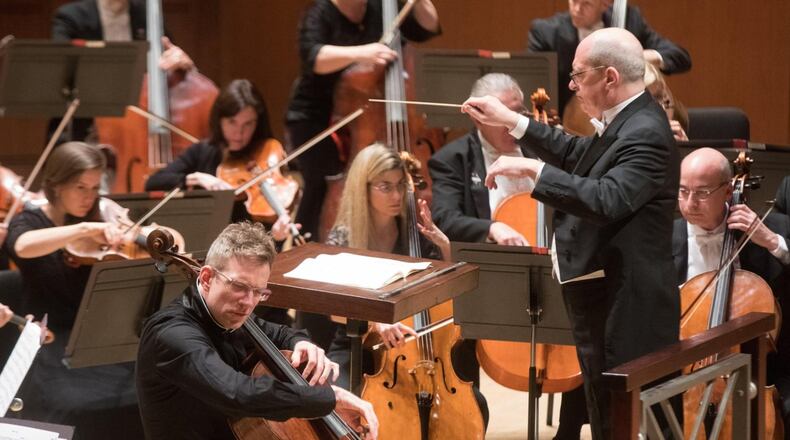Hey, Atlanta Symphony Orchestra: "Give the drummer some!"
In the orchestral world, unlike the funk atmosphere inhabited by James Brown when he uttered that familiar phrase, well-worn repertoire doesn't usually highlight the percussion section. But on Thursday night, principal percussionist Joseph Petrasek drew the focus during the opening movement of Symphony No. 7 "Leningrad" by Dmitri Shostakovich.
Petrasek, who joined the ASO in 2017, unpacked a tight, militant drumroll, maintaining precision for more than 10 minutes while the ensemble played a commanding, strident melody, ad nauseam. Starting in a stage whisper and ascending to nearly ear-splitting levels (the musicians onstage were hopefully wearing earplugs), the stentorian figure passed through all sections of the orchestra, in varying dynamic levels, until it became one, large, roaring cry for … well, it’s hard to know exactly.
The jury’s still out on whether Shostakovich’s symphony, which premiered in 1942, should be known as a groundswell of Russian nationalism and propaganda written at the height of the World War II, a general commentary on the evils of fascism (here’s looking at you, Stalin), or simply, as American critic Virgil Thompson put it upon first hearing the work, music “written for the slow-witted, the not very musical and the distracted.” One thing is for sure: The anti-war message at the heart of this martial, substantive symphony certainly isn’t subtle.
Shostakovich’s symphony can get very loud, and here ASO music director Robert Spano controlled the orchestra, making all those screaming instrumental voices sound pleasant and in balance. The earth-shattering passages are set up brilliantly by the incredible warmth and near-stillness of certain passages. The ASO is as good soft as it is loud, and Spano knows how to make the orchestra respond instantaneously to his simplest or his most exaggerated gestures. While the 69-minute symphony can seem overlong, and the writing a bit sluggish in parts, Spano and company maintained direction throughout and kept a quick pace, refusing to get bogged down in the composition.
For as much force is generated by the inflated brass section, much of the "Leningrad" symphony really is a showcase for ASO's woodwinds. When, in the first movement, the woodwind brigade emerges to playfully contrast the stoic opening string melody, the section really never leaves the limelight. Oboist Elizabeth Koch Tiscione and English horn player Emily Brebach both excelled in solo passages, as did bass clarinetist Alcides Rodriguez and bassoonist Andrew Brady.
Of course, these woodwinds can only really be heard in the soft sections — except for the aggressively insistent E-Flat clarinet, played with buoyant joy by Ted Gurch, that bounds over the orchestral fray, leading the way with its thrillingly, pinch-toned timbre that is both toylike and filled with authority.
Thursday's program began with the cello-driven "Three Meditations From 'Mass'" by Leonard Bernstein, a concert-hall reworking of music from the composer's long-form, quasi-sacred work. The ASO performed another Bernstein re-composition — "Symphonic Dances From 'West Side Story'" — last week. Performed with guest cellist Johannes Moser, the meditations are at times spirited and avant-garde, and Moser amiably played through these spindly and disjointed bits of music. Moser was most effective in the more introspective passages, where his glassy, sparkling high register and warmly sonorous low end were a joy to hear.
CONCERT REVIEW
Atlanta Symphony Orchestra
8 p.m. Jan. 17 Additional performance at 8 p.m. Jan. 19. $28-$98. Symphony Hall, 1280 Peachtree St. NE, Atlanta. 404-733-5000, atlantasymphony.org.
IN OTHER NEWS:
About the Author
Keep Reading
The Latest
Featured


